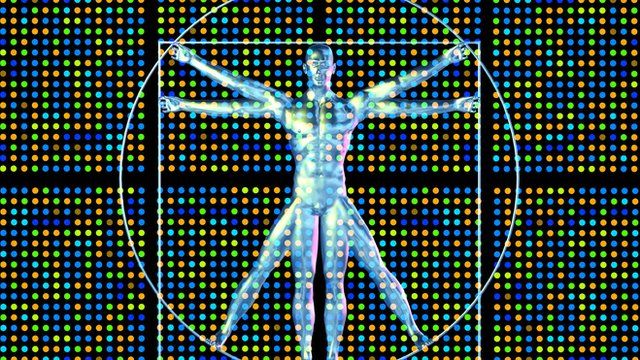Row over human embryo gene editing
- Published

A controversial Chinese study that reveals genes in human embryos have been modified for the first time has sparked fierce debate.
The research looked at genetic editing techniques - which in theory can be used to snip out faulty bits of genetic material that would otherwise lead to serious inherited diseases.
This is the first time it is known to have been attempted on early human embryos. But the results suggest it can cause new, unintended genetic errors.
Experts are questioning whether the procedure - which, if taken further, could lead to genetic changes being passed on to future generations - has crossed ethical, moral and legal lines.
Discarded embryos
The study was published in the less well-known journal Protein and Cell, by a team of scientists from the Sun Yat-sen University, Guangzhou.
There are claims that more established journals such as Nature and Science rejected it on ethical grounds.
Researchers say they collected faulty human embryos incapable of leading to live births, from discarded stores at fertility clinics.
Using gene editing complexes they then tried to cut out and replace a gene responsible for a serious blood disorder.
But in many cases the procedure failed. And in some embryos, new genetic mutations, so-called off-target effects, arose in unexpected places.
Scientists suspect this was down to the gene editing technology working in places it was not intended to.
Researchers concluded these off-target effects "need to be investigated thoroughly" before any attempts to take the procedure to the clinic.
'Unpredictable effects'
There have been strong reactions to this paper on several grounds.
Many focus on what would happen if embryos modified in this way were implanted in wombs and allowed to develop into live births.
This could mean dangerous, newly created genetic changes are passed on from one generation to the next.
And others argue the technology could be exploited to alter genes for cosmetic reasons.
Dr Yalda Jamshidi, at St George's University Hospital, said: "In theory, replacing the defective gene with a healthy one would be the ideal solution.
"Researchers have been working on developing techniques to accomplish this for many years.
"However, altering genes in human embryos can have unpredictable effects on future generations."
Others have questioned whether these techniques are even legal under current laws.
Prof Robin Lovell Badge, at the Crick Institute, says such procedures could be legal in the UK if granted a licence after careful consideration by the Human Fertilisation and Embryology Authority.
But it would be illegal to then implant the embryos into a woman for further development.
Meanwhile in the US, it would not be possible to do this with federal funding. But finances from private companies and charities could be used in states that do not ban the procedure, he says.
As gene editing methods become simpler and more widely available, some scientists argue firm global governance is needed.
And they say regulations must make clear the difference between gene editing used in reproductive cells rather than cells that are not passed on.
Several trials are underway attempting to modify non-reproductive cells as an approach to treat cancer, for example.
But how international regulations would be enforced on technology that is easily accessible and developing at a fast pace, is unclear.
Some experts have gone even further, calling for a moratorium on further studies while science and society decide how far the technology should be allowed to go.
Genetic hopes
But despite the uproar, not everyone is against the research.
They argue that studies which bring us incrementally closer to eliminating life-limiting genetic diseases must be allowed to continue.
Prof Lovell Badge says he is fully supportive of research being carried out on early human embryos in laboratory settings - especially on embryos that are not required for reproduction and would otherwise be discarded.
If the techniques work, he says, there are many questions that could be asked about the role of specific genes in early human development.
And should the technology be proven safe and effective with further trials, the nature of the argument could change.
Prof Darren Griffin, at the University of Kent, argues if these obstacles are overcome, the next consideration is whether it crosses a moral boundary to apply it to patients.
"Equally, some will ask if the procedure is safe, do we have a moral imperative to make sure that we do it?"
- Published19 January 2015